The 7 greatest Roman emperors in history
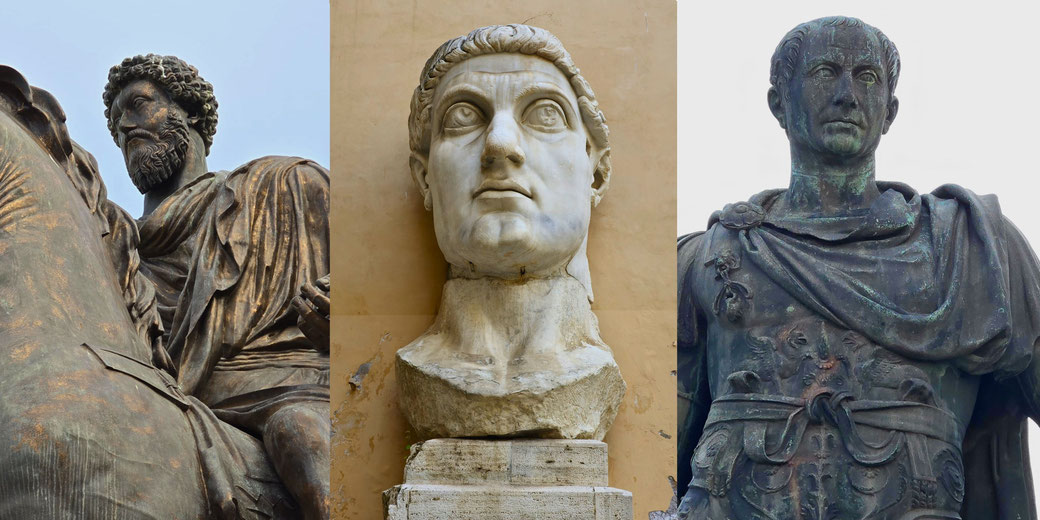
From Augustus to Constantine, the Roman Empire often relied on capable individuals who stabilised political chaos, controlled military power, and managed extensive territories that stretched from Britain to Mesopotamia.
Certain emperors often reorganised Roman society, secured its frontiers, and changed the administrative and religious systems that supported it.
When we trace how these men governed, reformed and defended the empire, we can understand why their names still help modern audiences to define what is meant by 'Roman greatness'.
1. Augustus Caesar
After the assassination of Julius Caesar and a decade of civil conflict, Gaius Octavius secured control over Rome when he defeated Mark Antony and Cleopatra at the Battle of Actium in 31 BCE.
Before that, he had also eliminated Brutus and Cassius at the Battle of Philippi in 42 BCE, which removed the chief conspirators behind Caesar's murder.
In 27 BCE, he accepted the title “Augustus” from the Senate, and he presented himself as restorer of the Republic.
His political genius largely lay in presenting absolute rule under a republican appearance.
As princeps, he effectively controlled the army, treasury, and provinces. He introduced fixed-term military service, settled veterans across the empire, and created the Praetorian Guard as his personal bodyguard.
Importantly, he invested in massive building projects, and he used wealth from Egypt to restore temples, construct aqueducts, and beautify Rome with marble facades.
His urban renewal included monuments such as the Ara Pacis, which celebrated Augustan peace and religious authority.

In addition, Augustus used literature and coinage to reinforce his public image.
Authors like Virgil and Horace praised his leadership, while coins depicted him as a bringer of peace and religious order.
His social legislation included the Lex Julia of 18–17 BCE, which promoted marriage and childbirth among the elite, although the laws applied more broadly to Roman citizens and aimed to reinforce traditional values.
Over time, his reforms created a durable framework that persisted intact for centuries.
He died in 14 CE, leaving power to Tiberius and ensuring that dynastic succession would become a permanent feature of Roman imperial rule.
2. Trajan
Marcus Ulpius Traianus, who was born in Italica in 53 CE, became emperor in 98 CE after adoption by Nerva.
From the beginning, he earned trust because he balanced military command with respect for senatorial tradition.
His reign combined conquest with public generosity.
First, he led Rome’s armies across the Danube, and he launched two campaigns against the Dacians between 101 and 106 CE.
Their defeat yielded what ancient sources estimate as approximately 165,000 kilograms of gold and 331,000 kilograms of silver, figures that may reflect exaggeration.
Nevertheless, it points to a substantial influx of wealth that fuelled decades of imperial spending, as Trajan used these resources to fund major projects such as his Forum, Market, and Column, which celebrated his victories with detailed stone reliefs.
Then, in 113 CE, he began an eastern campaign that expanded Roman control deep into Parthian territory.
Though some eastern provinces proved difficult to hold, his expansion reached the empire’s greatest extent.
At home, he introduced the alimenta, a welfare program for poor children that involved figures like Pliny the Younger in provincial administration.
He also improved provincial roads and grain supply systems. He died in 117 CE, still active in military affairs, and was succeeded peacefully by his adopted son Hadrian.
3. Hadrian
Hadrian became emperor in 117 CE and he reversed Trajan’s aggressive expansion by withdrawing from overextended eastern territories and focusing on securing the empire and its frontiers, which showed a move toward internal stability and long-term security.
To enforce this approach, he toured nearly every province where he regularly inspected legions and funded civic improvements.
Most famously, he ordered the construction of Hadrian’s Wall in Britannia, a defensive barrier that stretched 73 miles and also regulated trade and movement.
Across the empire, he funded temples, libraries, and baths, frequently in honour of Greek culture, which he greatly admired.
He also established cities like Hadrianopolis and renovated Athens to reflect his Hellenic ideals.
Hadrian also invested in legal and administrative reform, as he authorised the legal expert Salvius Julianus to revise and fix the Edictum Perpetuum, which aimed to set down and make consistent the evolving body of praetorian law.
He organised imperial edicts, made legal procedures clearer, and strengthened the role of equestrian officials in government.
His personal life, which was filled by grief after the death of Antinous, led to the creation of a new religious cult that spread widely across the empire.
He died in 138 CE, having preserved provincial institutions, restored administrative order and encouraged cultural cohesion across the provinces.
4. Marcus Aurelius
Marcus Aurelius ruled from 161 to 180 CE and is best known for combining Stoic philosophy with his duties as emperor.
He spent much of his reign on military campaigns along the Danube where he repelled Germanic invasions during the Marcomannic Wars and maintained discipline across multiple legions.
Despite continuous warfare, he remained dedicated to fair government. He appointed capable governors, improved legal consistency, and sought to resist cruelty in legal proceedings.
During a plague outbreak, likely smallpox, he managed to maintain order and funded relief efforts, since the Antonine Plague killed over five million people and reduced the number of soldiers available.
He had co-ruled with Lucius Verus until Verus’s death, and he later elevated his son Commodus to co-emperor, a decision that significantly damaged Rome’s stability after his death.
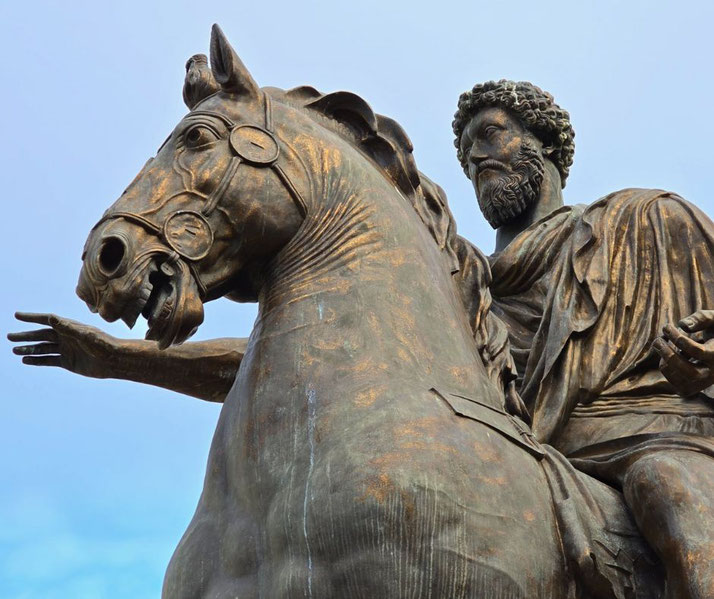
Importantly, Marcus composed his Meditations during his campaigns, in which he largely recorded personal reflections that examined duty, noted human transience and considered the claims of reason.
He was educated by tutors such as Junius Rusticus, Herodes Atticus, and Fronto, who helped him embrace Stoic principles since his youth.
The text provides a rare window into the mind of an emperor under pressure. He died in 180 CE, still stationed on the frontier, and he is often used as a model of reflective and principled leadership.
5. Constantine the Great
Flavius Valerius Constantinus rose to prominence during the collapse of the Tetrarchy.
After he had defeated Maxentius at the Battle of the Milvian Bridge in 312 CE, he took control of the western empire.
According to Lactantius, he experienced a religious dream. Eusebius later described a vision in the sky that featured the Chi-Rho symbol.
The phrase In hoc signo vinces became associated with this event, though it does not appear in the earliest sources.
Constantine reportedly had the symbol painted on his soldiers' shields. By 324 CE, he had defeated Licinius and had ruled as sole emperor.
After he secured power, he issued the Edict of Milan, which permitted Christian worship and returned confiscated property to churches.
He funded the construction of basilicas, granted privileges to bishops, and intervened in religious arguments.
He called upon church leaders to define beliefs at the Council of Nicaea in 325 CE, which was traditionally said to have gathered 318 bishops, and he used his authority to preserve unity across Christian communities and he condemned the teachings of Arius.
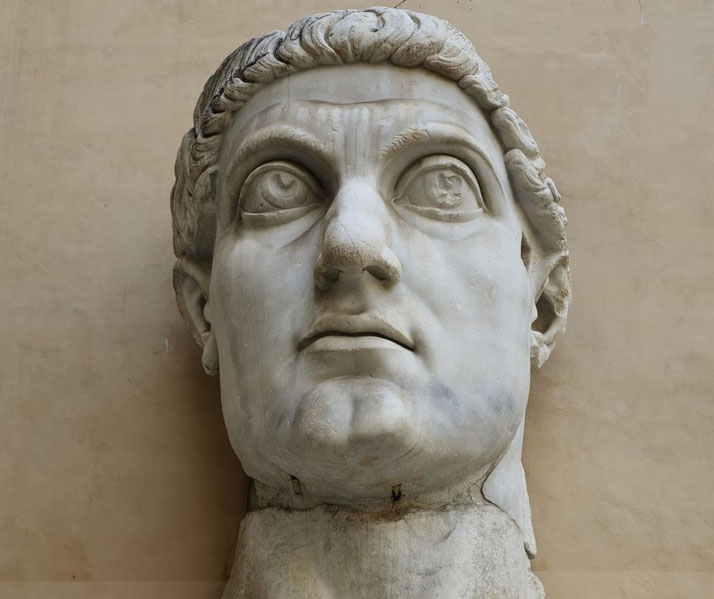
In government, Constantine introduced reforms that separated civil and military power, created new provinces, and made tax collection stricter.
He introduced the solidus, a reliable gold coin that helped steady trade and revenue.
When he founded Constantinople on the site of Byzantium and opened it in May 330 CE, he shifted imperial focus eastward and created a centre of power that would outlast Rome itself.
He died in 337 CE, having aligned imperial policy with Christian institutions, reorganised civil administration and shifted the centre of power east to Constantinople.
6. Vespasian
Titus Flavius Vespasianus seized power in 69 CE after a year of civil war and breakdown.
His background as a general in Britain and Judaea and his humble image and firm discipline helped him restore order across the empire.
He ruled with efficiency and practicality, and to rebuild Rome’s finances he imposed new taxes and took back control of state revenue.
Famously, he taxed public latrines and, according to Suetonius, dismissed objections with the phrase pecunia non olet, "money does not stink", in a conversation with his son Titus.
He also doubled the tribute from Egypt and restructured provincial taxation to ensure steady income.
More importantly, he funded infrastructure and cultural revival. His most lasting project began with the construction of the Flavian Amphitheatre, which was later known as the Colosseum and which was built on land seized from Nero’s private palace.
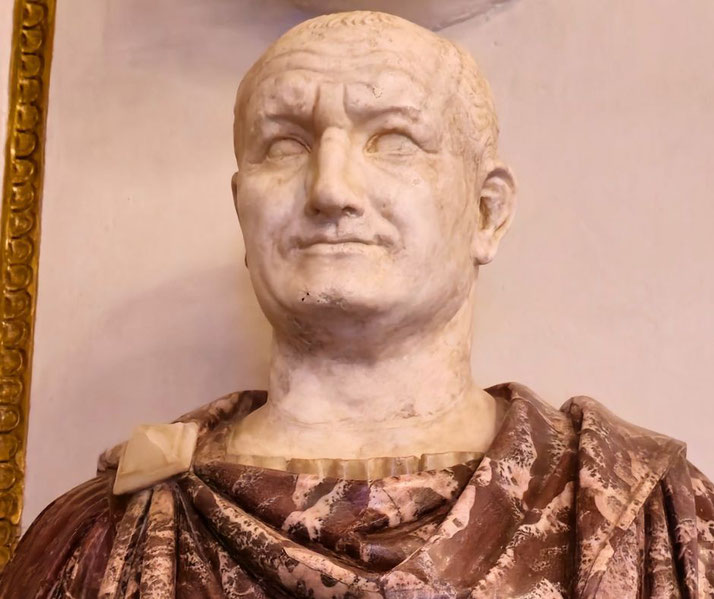
Vespasian also cracked down on corruption and restored the Senate's status, though he kept final control in his own hands.
He used public imagery to connect himself with prosperity and civic renewal, and he avoided dynastic arrogance.
Before he rose to emperor, he had already begun the suppression of the Jewish Revolt, including the siege of Jerusalem, which his son Titus completed.
He died in 79 CE after naming his son Titus as successor, ensuring a peaceful transfer of power and solidifying the Flavian dynasty.
7. Nerva
In 96 CE, after the assassination of Domitian, the Senate turned to Nerva, who was a senior senator and respected administrator, to restore political trust.
Though he was elderly and he lacked military command, he immediately adopted a calming tone and introduced reforms that largely repaired the damage Domitian had caused.
He released prisoners, returned confiscated wealth, and pledged not to execute senators without trial.
He worked to ease taxation and improve the treatment of provincials. To signal peace with the army, he issued a rare coin type inscribed with Concordia Exercituum as a symbolic gesture of reconciliation.
However, his authority faced serious resistance from the Praetorian Guard, who demanded punishment for Domitian’s assassins and forced him into concessions that weakened his position.
Because he recognised the need for stability, he adopted Trajan in 97 CE, securing military support and Senate approval.
That decision largely ensured a peaceful transition and laid the groundwork for an age of imperial excellence.
Nerva died in 98 CE, having restored the idea that emperors could rule with reason and without violence.
Why isn't Julius Caesar on the list?
Julius Caesar transformed Roman politics and introduced reforms that influenced every emperor who followed, but he never ruled under the constitutional structure of the Roman Empire.
Appointed dictator perpetuo in 44 BCE, he effectively concentrated power in his own hands and disregarded long-standing Republican customs.
His military victories in Gaul, Egypt, and during the civil war allowed him to dominate the state, but his position remained tied to personal rule rather than a lasting system.
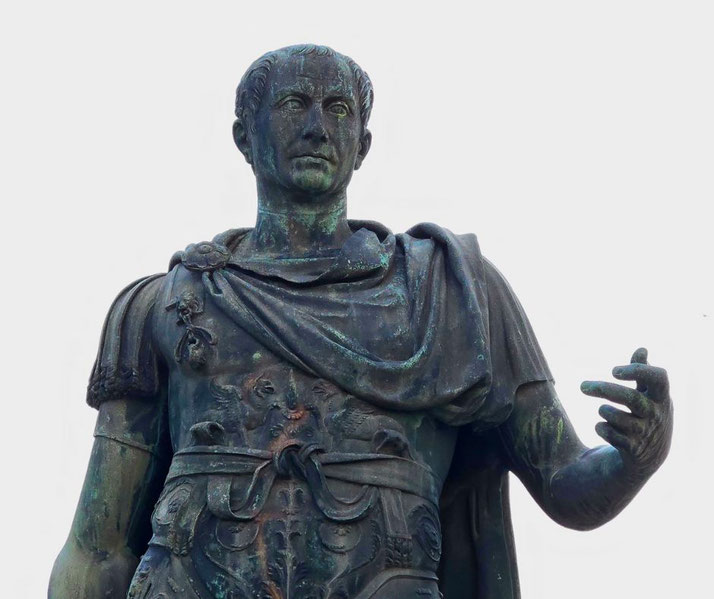
His assassination revealed the Senate’s continued opposition to monarchy, regardless of form.
Though his public works, calendar reforms, and legal policies had lasting effects, he did not leave behind a clear institutional model for future succession.
His rebuilding of the Forum Julium and plans to drain the Pomptine Marshes showed his vision for Rome, and his introduction of the Julian calendar established a 365-day year with leap years, though early implementation errors led to leap years occurring too frequently until Augustus corrected the cycle.
Instead, Augustus used his adoptive father’s reputation to create the principate.
Julius Caesar continued to be central to Roman history, but his leadership belonged to the violent transition between republic and empire, not to the imperial system that came afterward.
What do you need help with?
Download ready-to-use digital learning resources
Copyright © History Skills 2014-2025.
Contact via email
With the exception of links to external sites, some historical sources and extracts from specific publications, all content on this website is copyrighted by History Skills. This content may not be copied, republished or redistributed without written permission from the website creator. Please use the Contact page to obtain relevant permission.





